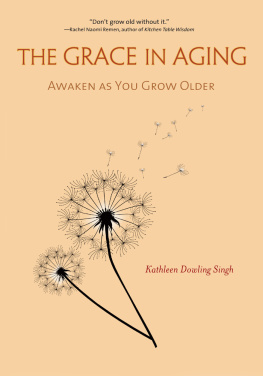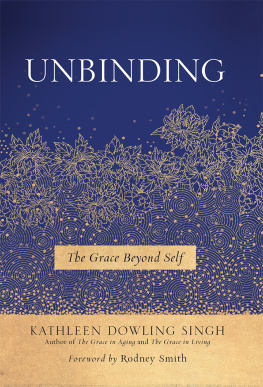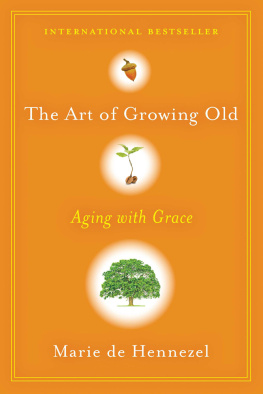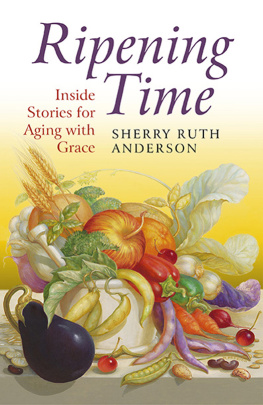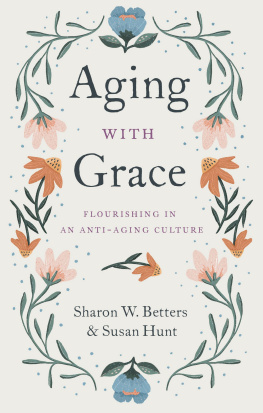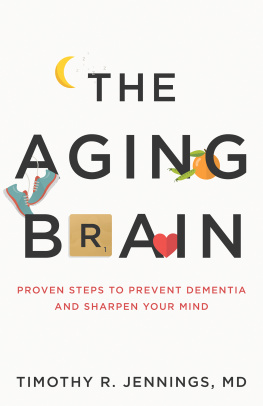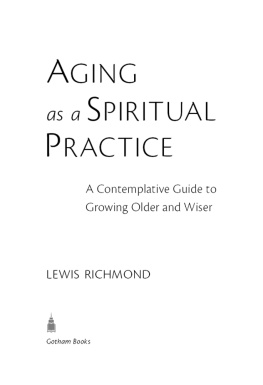THE GRACE IN AGING


Let Kathleen Dowling Singh be your guide in this extraordinary period of lifea time of celebration and a glorious opening to gentle wisdom and peacefulness.
Larry Dossey, MD, author of One Mind
LEARN TO USE YOUR LATER YEARS FOR AWAKENING AND SPIRITUAL GROWTH.
The Grace in Aging is a practical guide into our psycho-spiritual dynamics that can be helpful at any age but is especially tuned to the later stages of our life. Kathleen leads us forward with such dignity and resolution that we become convinced that this phase of life holds a promise and a potential unlike any other.
Rodney Smith, author of Lessons from the Dying
This wonderful book helps us to face and embrace the hard truth of the precarious nature of our life. Through Singhs skillful guidance we come to see that aging can be a time of grace and great aliveness.
Frank Ostaseski, founder, Metta Institute
Kathleen Dowling Singhs insight and wisdom are compelling, readable, and life changing (death changing too!). This book is indeed grace. It is both preparation and deep liberation.
Richard Rohr, OFM, author of Falling Upward
Wise and remarkably clear, The Grace in Aging can be a comfortable, easy, and peaceful fit for our deepest and heartfelt seekingand a wonderful space for our impermanent minds to explore.
Jean Smith, author of Now: The Art of Being Truly Present

KATHLEEN DOWLING SINGH is a Dharma practitioner, psychotherapist, and in-demand speaker and teacher. She is the author of The Grace in Dying: How We Are Transformed Spiritually As We Die. A mother and grandmother, she is old enough to be eligible for Medicare. Kathleen lives in Sarasota, Florida.
With healing the hallmark
of each and every step,
and grace the tender reward.
K EN W ILBER
CONTENTS

T HE PROFOUND SPIRITUAL TEACHER Wei Wu Wei calls any conversation about awakening the most important discussion to be had. This book is an offering to that conversation, not because you do not know the truth... but because you know it already(1 John 2:21).
My wish is that your reflection on the questions posed throughout this book will stir and deepen whatever longing you may ever have had to awaken, to reach the deep, still heart of the great mystery we call life. It can be illuminating to pause with each question and explore and contemplate our own unique answers. The Questionnaire on Aging, the appendix, offers an additional opportunity for some deep reflection as to how you wish to spend the last years of your life.
I have tried to speak ecumenically, in broad strokes, to underscore the one Dharma, the one truth underlying all wisdom traditions. If you are far along a particular path, you will note where some words or sentences are not quite accurate or resonant within the view of your path. Translate. Use the words here lightly for inspiration and the words of your own tradition precisely for progress.
M Y ENDLESS GRATITUDE goes to all of the kind teachers who guided me toward making my life such a rich one. In particular, Rodney Smiths penetrating insights have been enormous gifts.
My gratitude also goes to my children, grandchildren, and brothers for all of the support and love and joy that they have always given me. To my sangha, dear circle of spiritual friends, thank you for all you have meant for all of this time.
I also want to thank all of the aging and dying and grieving and growing people who have shared themselves with me and taught me so much.
To my generation, especially now as we enter our last chapters: may we all grow in the beauty, peace, and grace of awakening.

The Grace in Aging approaches a topic that is, like death and dying, both difficult to contemplate and to experience. Aging and dying are topics that we tend to resist exploring in any but the most superficial of ways. We quite often hold them at arms length or keep them hidden away or view them as somehow relating more to someone elses future. The truth, which many of us would prefer to resist, is that both aging, if we live long enough, and dying are inherent, inevitable aspects of every human life. The energy involved in resisting the truth of both aging and dying can keep us confined in a limited experience of living, a limited experience of the simple joy of being here now.
Dying is a naturally transformative experience in a human life. In the process of dying, we are freed from our confinement in the sense of self, the very source and site of our suffering and our separation from the sacred. In that freeing, awareness previously held in limitation, in self-reference, is released into awareness that is radiant and complete and holy. There is something undeniably powerful and sacred in either being a witness to anothers dying or being the one in the process of coming close to death.
Although the dying process holds hope for deep, natural psychospiritual transformation, we cannot necessarily find hope in the process of aging in and of itself. It is certainly possible to experience aging with some real measures of denial or unmindfulness. There are many who enter the end of life, at ripe old ages, untapped and unexamined and filled with virtually as much confusion and unease as they were throughout all of the decades of their lives.
There seem to be a number of reasons why this is so. Aging moves more slowly than dying; it is a bit more muted in its urgency and a bit more imperceptible. It lacks the focus and sharp, compelling sequentiality of the process of active dying. Although it becomes a little bit harder to do so each day, aging still permits us to evade the truth of our own impermanence in a way that dying does not. Such evasions obstruct awakening.
Aging simply does not have the gathered intensity of dying. That gathered intensity, with all of the accompanying special conditions it engenders, is a crucible for transformation, for awakening. Simply aging, simply becoming an elderly person, offers no such transformative crucible. There is nothing in the process of simply getting older that, in and of itself, is going to make our eventual decline and illness and all of our losses either transformative or hopeful.
Whatever transformative experience we have of aging is dependent upon our own intention.
There are many ways to deal with living our older years. There are seventy-nine million of us in our generation just in the United States. Many ways to approach aging will be chosen, either deliberately or by default. Some ways will have more wisdom and will lead to more peace than others; some ways will lack wisdom and will lead to more stress and hopelessness and bewilderment, the phenomenon psychologist Erik Erikson called ego despair.
The Grace in Aging speaks directly to those who have been stirred in their lifetime by the wish to awaken, to live in more sane, more kind, and more peaceful minds, to live in a more deeply sensed connection with the sacred. Hundreds of thousands of those of us who are aging have dabbled in awakening practices, flirted with them, perhaps even made such practices and the longing that drives the practices a real and present part of our lives.
Next page
